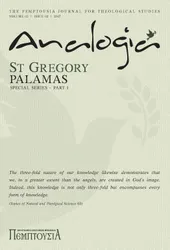The beginning of the Roman Catholic/Orthodox Theological dialogue during the 20th century raised to some high hopes for an imminent canonical unity between the two Denominations, and this, though premature, is not of course to be blamed; it is impossible for any contemporary Christian theologian not to suffer from the division within this very womb of the ontological unification of all things, which is the Church of Christ—precisely because this division gives to many the impression of a fragmentation of the Church’s very being and subsequently weakens her witness.
Contents: 1. Manifesting Persons: A Church in Tension, ANDREW T.J. KAETHLER;
2. Ab astris ad castra: An Ignatian-MacIntyrean Proposal for Overcoming Historical and Political-Theological Difficulties in Ecumenical Dialogue, JARED SCHUMACHER;
3. Simon Peter in the Gospel according to John: His Historical Significance according to the Johannine Community’s Narrative, CHRISTOS KARAKOLIS;
4. The Scythian Monks’ Latin-cum-Eastern Approach to Tradition: A Paradigm for Reunifying Doctrines and Overcoming Schism, ANNA ZHYRKOVA;
5. Beauty is the Church’s Unity: Supernatural Finality, Aesthetics, and Catholic-Orthodox Dialogue, NORM KLASSEN;
6. Ecumenism and Trust: A Pope on Mount Athos, ANDREAS ANDREOPOULOS;
7. God’s Silence and Its Icons: A Catholic’s Experiences at Mount Athos and Mount Jamna, MARCIN PODBIELSKI;
8. Councils and Canons: A Lutheran Perspective on the Great Schism and the So-Called Eighth Ecumenical Council, JOHANNES BÖRJESSON;
9. Christological Or Analogical Primacy. Ecclesial Unity And Universal Primacy In The Orthodox Church, NIKOLAOS LOUDOVIKOS;
10. Ecumenism, Geopolitics, and Crisis, JOHN MILBANK;
11. Concluding Reflections on Mapping the Una Sancta. An Orthodox-Catholic Ecclesiology Today, MARCELLO LA MATINA;











